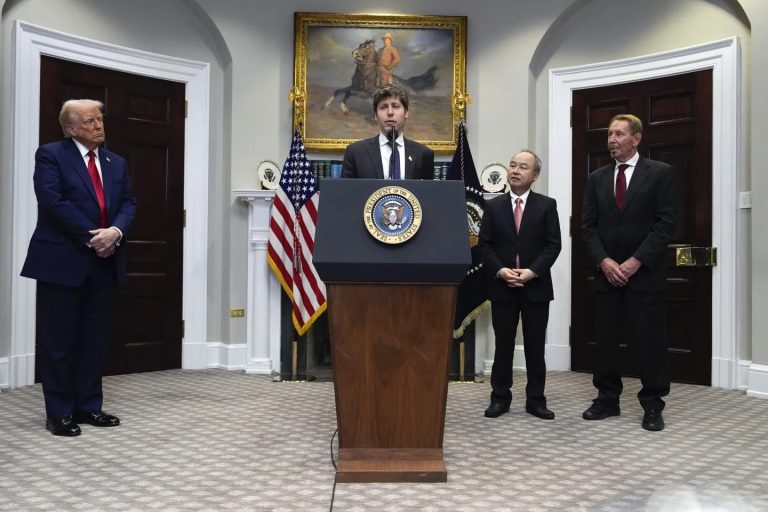
OpenAI’s ambitious Stargate data center project, a cornerstone of its strategy to bolster AI infrastructure in the U.S. and abroad, is encountering significant delays due to economic uncertainty fueled by U.S. tariffs on Chinese imports.
The project, which aims to raise up to $500 billion for AI and energy infrastructure by 2029, is struggling to secure financing as investors grapple with rising costs, market volatility, and concerns over data center overcapacity.
Announced on January 21 by U.S. President Donald Trump, the Stargate project is a collaborative venture involving OpenAI, SoftBank Group Corp., Oracle, and investment firm MGX. Named after the 1994 sci-fi film Stargate, the initiative has been likened to the Manhattan Project for its scale and potential to reshape the AI industry. The project’s goal is to deploy an initial $100 billion in capital, with plans to scale to $500 billion by 2029, to build large-scale data centers and energy generation facilities exclusively serving OpenAI’s AI models, such as ChatGPT. The project is designed to exclusively serve OpenAI.
Register for Tekedia Mini-MBA edition 19 (Feb 9 – May 2, 2026).
Register for Tekedia AI in Business Masterclass.
Join Tekedia Capital Syndicate and co-invest in great global startups.
Register for Tekedia AI Lab.
The project’s strategic importance was emphasized by OpenAI’s chief global affairs officer, Chris Lehane.
“Whoever ends up prevailing in this competition is going to really shape what the world looks like going forward, whether we have democratic AI that’s free and open, or authoritarian AI that is autocratic,” he said in February.
This framing positions Stargate as a critical effort to maintain U.S. leadership in the global AI race, particularly against China.
Tariff-Induced Cost Pressures
The primary obstacle to Stargate’s progress is the economic uncertainty stemming from U.S. tariffs on Chinese imports, which have persisted under Trump’s administration. These tariffs are poised to significantly increase the cost of data center construction. An analysis by TD Cowen, reported on Monday, estimates that “hiked prices for server racks, cooling systems, chips, and other components could contribute to overall build cost rises of 5-15% on average.” This cost escalation is a major concern for potential investors, who are already navigating a challenging economic environment marked by market volatility.
The tariffs, part of broader U.S.-China trade tensions, have created a ripple effect across the tech industry, with companies like Apple also facing pressures to raise prices or shift production. For Stargate, the increased costs threaten to inflate the project’s already massive budget, making it a riskier proposition for financiers.
SoftBank’s Financing Challenges
SoftBank, a key partner in the Stargate venture, announced in January that it would contribute significant capital, with plans to “immediately” deploy $100 billion and eventually scale to $500 billion. However, more than three months later, the company has made little progress. The company has yet to develop a financing template or begin detailed discussions with potential backers.
Beyond tariffs, investors are grappling with additional concerns that are dampening enthusiasm for the Stargate project. Growing market volatility and the emergence of cheaper AI services have raised questions about the long-term viability of such a massive investment. These factors have led to a cautious approach among financiers, who are wary of committing to a project with significant upfront costs and uncertain returns.
Additionally, there are concerns about an overcapacity spike in the data center sector. Tech giants like Microsoft and Amazon have recently adjusted their data center strategies, with some pulling back on construction projects. This trend has heightened investor fears that the market may become oversaturated, potentially reducing the profitability of new data center ventures like Stargate.
Potential for International Expansion
However, there are indications that Stargate may look beyond the U.S. to mitigate some of the tariff-related challenges. Last month, it was reported that the project is considering “international expansion,” with potential plans to explore opportunities in the U.K., Germany, and France. This strategy could help diversify the project’s supply chain and reduce exposure to U.S. tariffs, but as of Monday, no concrete progress has been reported on international efforts, suggesting that these plans remain in the early stages.
So far, the Stargate project remains stalled, with no significant updates indicating progress on financing or construction. The lack of a financing template and the absence of detailed discussions with investors highlight the significant hurdles facing the initiative.



